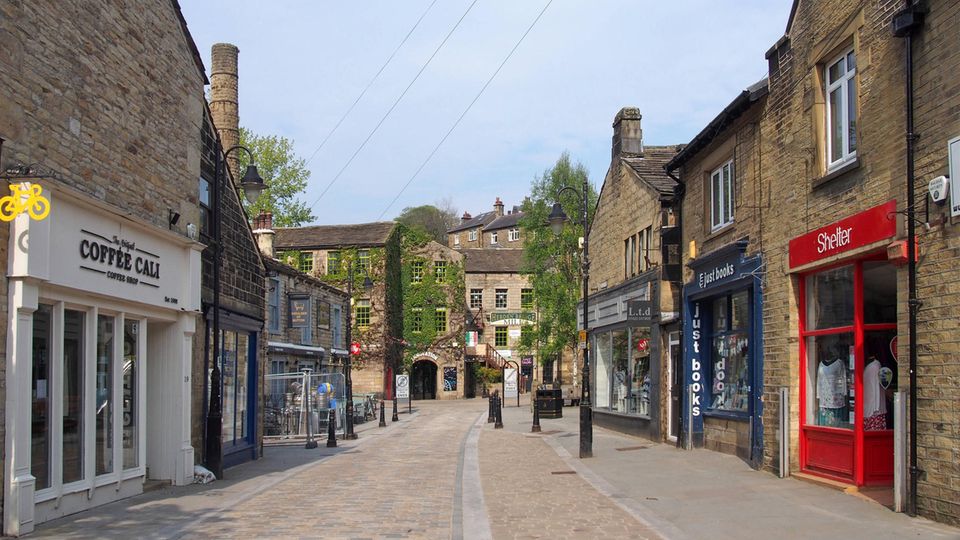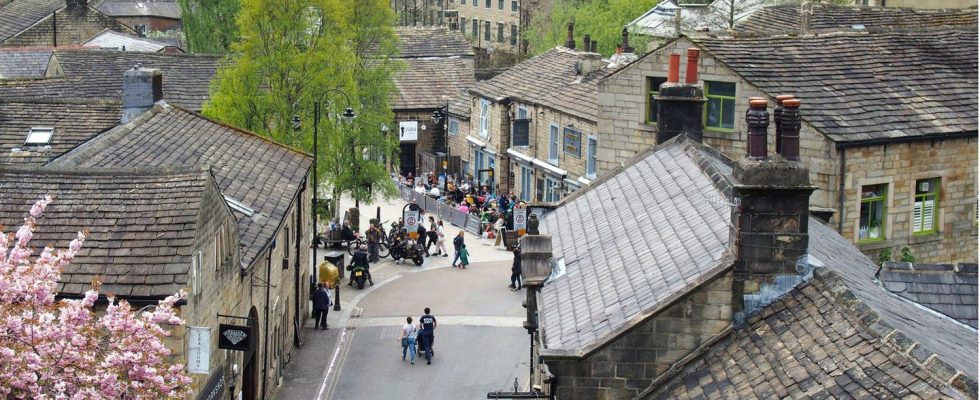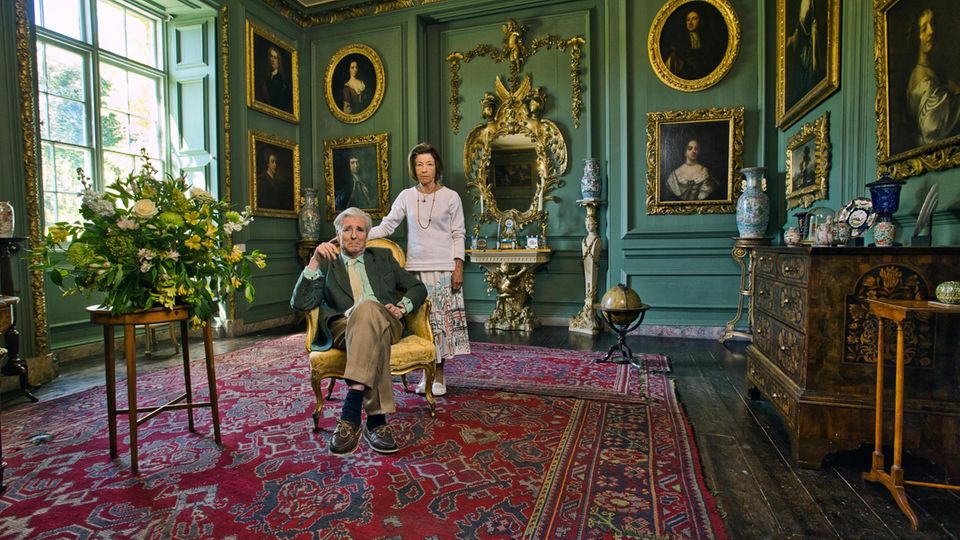Hebden Bridge in West Yorkshire is just a village of 5200 people, yet it is one of the most tolerant and alternative places in Britain. Because of the high density of queer people, the picturesque market town is also known as the “Lesbian Capital of the UK”.
At first glance, Hebeden Bridge looks like a well-preserved industrial Victorian town. Nestled in West Yorkshire’s Upper Calder Valley, the market town has a quintessentially small English town feel with its narrow streets and brick houses. Only at second glance does it become apparent what the place has long been known for: a liberal, alternative lifestyle that has drawn artists and supporters of the LGBTQ+ community there for decades. The community with its 5200 inhabitants is even considered the “Lesbian Capital of the UK”. Nevertheless, the town is hardly known internationally – and therefore still a real insider tip.
Hebden Bridge: From “Pants City” to “Lesbian Capital of the UK”
The community used to be known as “Pants City”. The nickname is according to the “Yorkshire Post” This is due to the fact that a large amount of clothing was once manufactured in Hebden Bridge. The River Calder, which runs through the city, and access to major wool markets made Hebden Bridge the ideal location for water-powered weaving mills. They helped the city prosper. During the 20th century the weaving mills declined in importance until they all gradually closed down, workers left the city and more and more buildings stood empty, leaving Hebden Bridge to decay by the 1960s Low point, which ultimately saved the city from decline.
Like among other things “National Geographic” and “The Guardians” report, the low prices attracted artists, hippies and conservationists who bought or rented the cheap buildings from the 1970s onwards. The newcomers laid the foundation for the small town’s alternative reputation. “The culture of spindles, looms and treadmills had died . Life seeped out of the city,” writes the “Guardian”. Instead of textiles, Hebden Brige now manufactures lifestyles. “Everything is super-alternative,” confirms Jade Hudson from Hamburg in an interview with the star. Her aunt has lived in Hebden Bridge for many years and works in a shop selling ‘trinkets’. In German something like: “Little things that you don’t need from a rational point of view, but that your heart really wants to have”. One of the first memories the half-British woman has of Hebden Bridge is the special gifts her aunt sent her as a child. Including a pink dress with a sports car printed on it, which has become her personal symbol of the small town.
Nine percent of residents belong to the LGBTQ+ community
Therefore, she has always felt a certain curiosity about the place from which these gifts came. That year she visited Hebden Bridge for the first time and describes the place as a “fairytale town”, a mixture of English village and hip city. There are cozy cafes and typically British places for brunch and afternoon tea. Pubs, bars – including a cooperative pub owned by more than 200 residents – and music clubs, some of which are nationally known, testify to a vibrant nightlife. “For the surrounding area, Hebden Bridge is a party town where you go to party at the weekend,” says Jade Hudson. A country-level party town, she adds. “Of course you can’t compare it with Berlin or Hamburg.” However, in the small community you will still find plenty of shops that you would probably associate more with Berlin or Hamburg than with a British village: art galleries, vintage clothing stores and vegan restaurants.

A street in Hebden Bridge lined with cafés and small shops
© Zoonar / Imago Images
Not to mention the shop windows with cute odds and ends (the “Trinkets”). “The shops are aesthetically pleasing: old, but still colorful and diverse,” says the 27-year-old. Also sold are rainbow gift items and wedding greeting cards that address the newlyweds as Mrs. and Mrs. or Mr. and Mr. Pride flags can be seen on every corner and fly year-round. The LBGTQ+ community also settled in Hebden Bridge in the 1970s and 1980s. Lesbian couples in particular feel at home in the open-minded town, reports the “Huffington Post”. At a time “when homosexuality was still partially criminalized, lesbian couples found a supportive community in Hebden Bridge,” explains the Yorkshire Post. As a result, it has long been said to have the most lesbians per capita in Britain. But now the entire LGBTQ+ community is equally represented there, so the city is characterized by “a large LGBTQ+ population, a supportive community around it and a thriving music, arts and creative scene”. The LGBTQ+ community is now even statistically recorded. In the 2021 census, nine percent of residents said they identified as lesbian, gay, bisexual, or otherwise part of the community. According to the “Guardians” That’s about three times the national average.
The reputation as an LGBTQ+ stronghold is attracting more and more like-minded people
The small town has adapted to this. Event locations have a strict policy against homophobia, transphobia and misogyny. There is a queer hiking group. And at Happy Valley Pride, the small town celebrates its colorful community. According to the Yorkshire Post, the festival came about as a protest response to homophobic graffiti left by unknown individuals in Hebden Bridge in 2015. The locals register this incident as a “weekend effect”: weekend trippers are almost exclusively responsible for homophobic attacks. Because the residents are proud of their community, which feels safe and accepted there. “It’s nice to be able to be yourself without feeling like you’re in a minority,” says Amy Mellis BBC. “The kids and teenagers are the same, they have friends with same-sex parents,” Sean Pert told the Yorkshire Post. Both live in Hebden Bridge and have same-sex relationships.
Ranking for 2023
Australia to Portugal: these are the top 12 travel destinations for members of the LGBTQI+ community
“You can tell that people are very open about the subject. You don’t have to be afraid of being made fun of for holding hands or kissing your partner,” reports Jade Hudson from her conversations with the locals. She self-identifies as heterosexual. “Rural areas are not homophobic per se,” Sally Hines, director of the Center for Interdisciplinary Gender Studies at the University of Leeds, told the BBC. The fact that only cities are tolerant of the LGBTQ+ community is a prejudice. As soon as an area has gained a reputation for being home to queer people, more and more like-minded people flock there, the expert explains. She speaks of a circular migration pattern. So, queer people often choose to live in places that they feel offer more freedom—whether in the city or in the country.
A life at risk of flooding
Life in the community, “in which being different is celebrated,” writes the portal “Yorkshire Live“, but has its price. The demand for real estate is so high that purchase and rental prices have skyrocketed in recent years. The “Financial Times” reported back in 2016 that the properties are selling at a premium of 26 percent compared to other towns in the Calder Valley. While the valley’s location is scenic and peaceful, it makes Hebden Bridge prone to flooding in the summer of 2012 and winter of 2015 “The small town experienced two devastating floods. Locals who have lived in Hebden Bridge for decades – like Jade Hudson’s family – are used to smaller floods. “It’s part of life for them,” she says. Whether that brings the community closer together ?
However, it is the “community spirit” that residents value most about where they live, according to the BBC report. The locals seem cheerful and outgoing, says Jade Hudson. “It was a friendly, relaxed atmosphere that you can just be in,” she says. No wonder, then, that the small town is known as one of the best places for those looking for an alternative lifestyle? “The whole spectrum of everything you can be as a person can feel comfortable there,” the 27-year-old is certain.
Sources: city population“Financial Times“, “Huffington Post“, “National Geographic“, “The Guardians (I)”, “The Guardians (II)”, “Yorkshire Post“, “Yorkshire Live“


